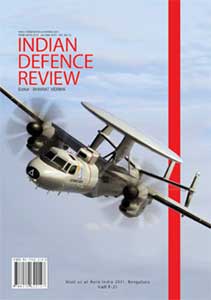The ongoing development projects in the Gilgit-Baltistan region of PoK, which are of strategic significance with regard to the India-China-Pakistan triangle, are testament to this intent.
Among the infrastructure reconstruction projects that China and Pakistan have continually accorded importance, is the repair and consequent upgradation of the Karakoram Highway. The National Highway Authority (NHA) of Pakistan and the China Road and Bridge Corporation (CRBC) signed an agreement for the reconstruction/rehabilitation of the Karakoram Highway. According to views expressed in the Lahore-based Daily Times, NHA Chairman, Altaf Ahmed Chaudhry said that a 17 km road will be constructed on a new alignment while a 7 km section will be rehabilitated. Chaudhry also accepted that the current project includes construction of two tunnels, two bridges and 70 culverts.
As far as China is concerned, the Karakoram Highway is integral to keep Pakistan’s military strength sustained against India. Keeping India engaged through the channel of ‘spoiler state’ Pakistan has been Beijing’s foreign policy objective for a long time. The ongoing development projects in the Gilgit-Baltistan region of PoK, which are of strategic significance with regard to the India-China-Pakistan triangle, are testament to this intent. Indian concerns on China’s growing connectivity with Pakistan by means of linkages through the occupied territory of J&K have already been placed on record in the 2008-09 Annual Report of the Ministry of Defence (tabled in the Rajya Sabha). The report states that “… enhancing connectivity with Pakistan through the territory of Jammu and Kashmir, illegally occupied by China and Pakistan will have direct military implications for India.”
If on the one hand, India and China failed to resolve the contentious subject of future defence exchanges, on the other hand, Premier Wen’s call for further enhancement of military exchanges between China and Pakistan only seeks to fortify their partnership hereafter. According to a Xinhua news report, during Premier Wen’s meetings with Pakistan’s Chairman of the Joint Chiefs of Staff Committee, Khalid Shameem Wynne, Chief of the Army Staff, Ashfaq Pervez Kayani, Chief of the Naval Staff, Noman Bashir and Chief of the Air Staff, Rao Qamar Suleman, a mutual appreciation of the role that military collaboration has played between Beijing and Islamabad was agreed upon.
Concluding Observations
 Since the time when Mao Zedong stood before a sea of people at Tiananmen Gate sixty one years ago, and proclaimed the founding of the People’s Republic of China, Beijing has geared up to showcase its arrival and resultant prowess to the Asian region. China is operationalizing various channels that constitute a part of its negotiating strategy to deal with all outstanding disputes (including one shared with India). China appears to be pursuing a subtle yet lucid policy of keeping India pinned to the sub-continent. This has widely been marked in activities undertaken by China in India’s neighbourhood—thus buttressing that it is about time that New Delhi gets into a realist stock-taking mode. The realist mode according to me could be described as one which counteracts and negates the understanding that the economic facet of Sino-Indian ties would constitute the key to the success of the future relationship. In all firmness, economic stakes and convergences cannot take the liberty of discounting the existential strategic divergences which shall only confirm to becoming a future spoiler in the Sino-Indian relationship, as both contend for a larger share of the global economic and strategic pie.
Since the time when Mao Zedong stood before a sea of people at Tiananmen Gate sixty one years ago, and proclaimed the founding of the People’s Republic of China, Beijing has geared up to showcase its arrival and resultant prowess to the Asian region. China is operationalizing various channels that constitute a part of its negotiating strategy to deal with all outstanding disputes (including one shared with India). China appears to be pursuing a subtle yet lucid policy of keeping India pinned to the sub-continent. This has widely been marked in activities undertaken by China in India’s neighbourhood—thus buttressing that it is about time that New Delhi gets into a realist stock-taking mode. The realist mode according to me could be described as one which counteracts and negates the understanding that the economic facet of Sino-Indian ties would constitute the key to the success of the future relationship. In all firmness, economic stakes and convergences cannot take the liberty of discounting the existential strategic divergences which shall only confirm to becoming a future spoiler in the Sino-Indian relationship, as both contend for a larger share of the global economic and strategic pie.




